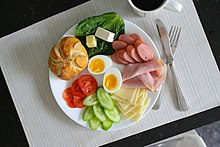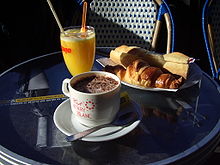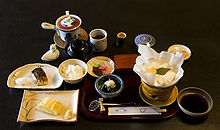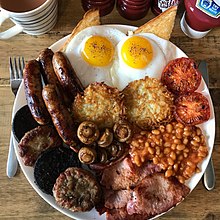Breakfast
![]()
This article is about the meal. For other meanings, see Breakfast (disambiguation).
Breakfast (in Swiss Morgenessen or dialectally Zmorge; outdated also Frühkost or Dejeuner) is the first meal of the day, usually eaten in the morning.
In Germany, Austria and Switzerland, breakfast often consists of a hot drink (usually coffee, tea, milk or cocoa) and baked goods, mainly bread, toast or rolls (southern German/Austrian Semmeln, Wecken; Swiss Weggli), plus butter or margarine and, as a sweet spread, jam, honey, nut nougat cream or sugar beet syrup, or as a savoury topping, sausage or cheese. Other popular breakfast ingredients in German-speaking countries are quark (Austrian: Topfen) and yoghurt, a breakfast egg or ham and eggs, muesli, breakfast cereals, juice and fruit.
A special form is the brunch, which combines breakfast and lunch and tends to be taken in the late morning. The term "brunch" is an English portmanteau and is made up of parts of the words breakfast and lunch. As brunch is often served buffet-style with a wide selection, it replaces breakfast and lunch at the same time in such cases and is thus considered suitable for late risers.

Polish breakfast

French breakfast

Traditional Japanese breakfast

English breakfast
Naming Motifs
The designation for the first meal of the day is based on different naming motifs in the various languages:
- The German word Frühstück (breakfast) goes back etymologically to the 15th century and originally meant the piece of bread eaten early in the morning. The word replaced the previously common Middle High German expression morgenbrōt.
- The English term breakfast refers to the "breaking of the fast" after the night, accomplished by the first intake of food on the new day.
- The same naming motif is present in Spanish desayuno (= breakfast), derived from ayunar (= fasting).
- The French is similar: petit-déjeuner (= breakfast) is literally a "small breaking of the fast". The term déjeuner (literally "breaking of the fast", jeûner = fasting) is usually used to refer to lunch; in some French-speaking regions, however, breakfast is called this.
- The Portuguese pequeno almoço refers to breakfast as a "small lunch", similar to French.
- In Italian, breakfast is called colazione (or prima colazione, literally "first meal"). This goes back to the ecclesiastical Latin expression collatio. In German, according to Meyers Konversationslexikon, the corresponding foreign word collation has, among other things, the meaning "in monasteries, the moderate supper on fast days, which designation is said to have originated from the fact that in the evening meetings, before the meal, a chapter from the Collationes patrum Sceticorum of Johannes Cassianus had to be read aloud; afterwards [the word collation] meant in general a simpler meal enjoyed outside the designated meal time."
- The Swedish word frukost and the Danish morgenmad refer (like breakfast and the Middle High German morgenbrōt) to the time of day when the meal is taken.
- The Dutch ontbijt (originally related to the German Imbiss) literally means "bite".
The morning consumption not so much of food as of stimulants such as alcoholic beverages or cigarettes is attributed in particular to social fringe groups. There are some regionally different, joking terms for this, such as "hooker's breakfast" or (in Austria:) "sandler's breakfast".
The importance of breakfast in different cultures
While breakfast as the first meal in the morning is a cross-cultural phenomenon, the design, rituals, timing, duration, and especially the size and nutritional components of breakfast often differ considerably between and within different cultures.
In African and Asian cultures, a sweet breakfast is largely unknown. In Northern and Central Europe, especially in Great Britain, breakfast is often considered the most important, central meal of the day and an external setting for meeting the whole family or domestic community. Nevertheless, many people in Europe and the USA nowadays do without breakfast: depending on the age and population group or the definition of "breakfast", the percentage of "breakfast avoiders" is between 10% and 30%.
Coffee as a beverage with breakfast gradually replaced wine and beer, which had been common with all meals, in the 18th century.
Health aspects
Eating breakfast appears to have a short-term positive effect on cognitive function in children and adolescents. This potential appears to be more pronounced in children who are already malnourished. However, the effects of breakfast composition and the long-term effects of breakfast are unclear due to insufficient studies in this area and problematic experimental designs.
In contrast, a recent study refutes the commonly held belief that a sumptuous breakfast helps you lose weight. The (incorrect) assumption here is that a rich meal in the morning has a long-lasting satiety effect. This ensures in consequence for the fact that one eats less with the other meals of the day and thus altogether over the day distributed less energy from food takes up. According to the researchers, however, exactly the opposite is the case: an overly rich breakfast increases the daily energy balance instead of lowering it, since the additional energy consumed at breakfast is not saved again by restraint at the other meals. The popular wisdom of eating breakfast like an emperor, lunch like a king and dinner like a beggar may be true, but it is not followed through. Other studies also show that it is basically irrelevant how the energy intake from food is distributed throughout the day, i.e. whether the main meal is eaten in the morning, at lunchtime or in the evening. What counts is only the sum of the energy supplied by food per day.

Hanna Pauli: Breakfast Time (1887)
_At_Breakfast.jpg)
Zinaida Serebryakova: At Breakfast (1914)
Search within the encyclopedia